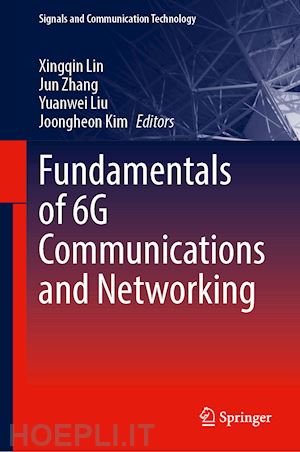
Questo prodotto usufruisce delle SPEDIZIONI GRATIS
selezionando l'opzione Corriere Veloce in fase di ordine.
Pagabile anche con Carta della cultura giovani e del merito, 18App Bonus Cultura e Carta del Docente
This book begins with a historical overview of the evolution of mobile technologies and addresses two key questions: why do we need 6G? and what will 6G be? The remaining chapters of this book are organized into three parts: Part I covers the foundation of an end-to-end 6G system by presenting 6G vision, driving forces, key performance indicators, and societal requirements on digital inclusion, sustainability, and intelligence. Part II presents key radio technology components for the 6G communications to deliver extreme performance, including new radio access technologies at high frequencies, joint communications and sensing, AI-driven air interface, among others. Part III describes key enablers for intelligent 6G networking, including network disaggregation, edge computing, data-driven management and orchestration, network security and trustworthiness, among others. This book is relevant to researchers, professionals, and academics working in 5G/6G and beyond.
Xingqin Lin is a Senior Standards Engineer at NVIDIA, leading 3GPP standardization and conducting research at the intersection of 5G/6G and AI. Before joining NVIDIA, he was with Ericsson, leading 5G/6G research and standardization in focus areas. He was a member of the Ericsson NextGen Advisory Board, collaborating with Ericsson Executive Team on strategic projects. He is an expert in wireless communications and technology strategy and a key contributor to 5G NR, NB-IoT, and LTE standards. His pioneering work has led to strategic opportunities, products, and real-world deployments in the telecom industry, enabling major network transitions from 4G to 5G. He has garnered several awards, including the IEEE Communications Society Fred W. Ellersick Prize (2021), IEEE Vehicular Technology Society Early Career Award (2021), IEEE WCNC Best Paper Award (2020), and IEEE Communications Society Best Young Professional Award in Industry (2020), among others. He serves/served as an editor of the IEEE Communications Letters (2015-2018), IEEE Communications Magazine (2022-now), IEEE Network (2021-now), IEEE Internet of Things Magazine (2021-now), and a guest editor for the IEEE Communications Magazine feature topic on “Aerial Communications,” IEEE Wireless Communications special issue on “AI-Powered Telco Network Automation: 5G Evolution and 6G,” and IEEE Journal on Selected Areas in Communications special issue on “3GPP technologies: 5G-Advanced and beyond.” He is an IET Fellow, an IEEE Senior Member, and an IET Fellow Assessor. He holds a Ph.D. in electrical and computer engineering from The University of Texas at Austin, USA.
Jun Zhang is an Associate Professor in the Department of Electronic and Computer Engineering at the Hong Kong University of Science and Technology. He received the Ph.D. degree in Electrical and Computer Engineering from the University of Texas at Austin. His research interests include wireless communications and networking, mobile edge computing and edge AI, and cooperative AI. Dr. Zhang co-authored the books “Fundamentals of LTE” (Prentice-Hall, 2010), “Stochastic Geometry Analysis of Multi-Antenna Wireless Networks” (Springer, 2019), and “Low-overhead Communications in IoT Networks – Structured Signal Processing Approaches” (Springer, 2020). He is a co-recipient of several best paper awards, including the 2021 Best Survey Paper Award of the IEEE Communications Society, the 2019 IEEE Communications Society & Information Theory Society Joint Paper Award, and the 2016 Marconi Prize Paper Award in Wireless Communications. Two papers he co-authored received the Young Author Best Paper Award of the IEEE Signal Processing Society in 2016 and 2018, respectively. He also received the 2016 IEEE ComSoc Asia-Pacific Best Young Researcher Award. He is an Editor of IEEE Transactions on Communications and IEEE Transactions on Wireless Communications. He served as a MAC track co-chair for IEEE Wireless Communications and Networking Conference (WCNC) 2011 and a co-chair for the Wireless Communications Symposium of IEEE International Conference on Communications (ICC) 2021. He is an IEEE Fellow and a Distinguished Lecturer of the IEEE Communications Society.
Yuanwei Liu is a Senior Lecturer (Associate Professor) with the School of Electronic Engineering and Computer Science, Queen Mary University of London. His research interests are NOMA, RIS, integrated sensing and communications, and machine learning. Yuanwei Liu is a Web of Science Highly Cited Researcher since 2021, an IEEE Communication Society Distinguished Lecturer, an IEEE Vehicular Technology Society Distinguished Lecturer, and the academic Chair for the Next Generation Multiple Access Emerging Technology Initiative. He received IEEE ComSoc Outstanding Young Researcher Award for EMEA in 2020. He received the 2020 IEEE Signal Processing and Computing for Communications (SPCC) Technical Early Achievement Award, IEEE Communication Theory Technical Committee (CTTC) 2021 Early Achievement Award. He received IEEE ComSoc Outstanding Nominee for Best Young Professionals Award in 2021. He is the co-recipient of the Best Student Paper Award in IEEE VTC2022-Fall, the Best Paper Award in ISWCS 2022, and the 2022 IEEE SPCC-TC Best Paper Award. He serves as a Senior Editor of IEEE Communications Letters, an Editor of the IEEE Transactions on Wireless Communications and the IEEE Transactions on Communications. He serves as the Guest Editor for IEEE JSAC on Next Generation Multiple Access, IEEE JSTSP on Intelligent Signal Processing and Learning for Next Generation Multiple Access, and IEEE Network on Next Generation Multiple Access for 6G. He serves as the Publicity Co-Chair for IEEE VTC 2019-Fall, Symposium Co-Chair for Cognitive Radio & AI-Enabled Networks for IEEE GLOBECOM 2022 and Communication Theory for IEEE GLOBECOM 2023. He serves as the chair of Special Interest Group (SIG) in SPCC Technical Committee on signal p











Il sito utilizza cookie ed altri strumenti di tracciamento che raccolgono informazioni dal dispositivo dell’utente. Oltre ai cookie tecnici ed analitici aggregati, strettamente necessari per il funzionamento di questo sito web, previo consenso dell’utente possono essere installati cookie di profilazione e marketing e cookie dei social media. Cliccando su “Accetto tutti i cookie” saranno attivate tutte le categorie di cookie. Per accettare solo deterninate categorie di cookie, cliccare invece su “Impostazioni cookie”. Chiudendo il banner o continuando a navigare saranno installati solo cookie tecnici. Per maggiori dettagli, consultare la Cookie Policy.